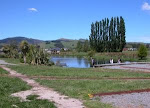People
have managed to save quite a lot on their power bills simply by learning about
their own power use and thinking about how to use less. Here are a few
ideas to get you started.
- How hot is your hot water?
A survey
of NZ homes found that about 1/3 of them had had dangerously hot water at the
tap. If it is, it can be a danger to children may risk being scalded and
you will be using a lot of power to keep it that hot.
Hot water
at the tap should not exceed 50°centigrade when running at its
hottest. Don’t make it too much lower than this – it also needs to be hot
enough to control bacteria in the water. Most electric or gas water
heaters have a thermostat fitted to control how hot the tank gets. The
thermostat at the tank should not exceed 60°C, so that water from the hot
taps flows at no more than 50°C.
2. Only turn stuff on when you are using it
Turn off
the TV, or lights when there is no-one in the room. Put the computer to sleep
if you are going to be away from it for a few minutes. Turn it off if you
are going to leave it for more than an hour. Turn these things off at the
wall overnight or during the day if you are not home.
3. Wash clothes in cold water
You know
this! Use cold water detergent and just do it.
Running
the machine only when you have a full load also saves power.
- Dry clothes outside in the Sun
As much
as possible hang your clothes outside in the sunshine. An added
benefit even in the winter is that UV light in sunshine helps to kill bacteria
on your clothes. Better still, put a clothesline under a carport, pergola
or other covered area for when it rains.
It IS
better to use a well vented dryer for a few minutes than to dry clothing on
racks indoors when it’s raining. Drying clothing indoors releases heaps
of moisture into your house making it damp and cold.
- Once dusk falls, close the curtains.
Keep room
heat in. Glass still loses heat, but more slowly when insulated from the room’s
warm air by lined curtains under a pelmet or by close-fitting fabric blinds.
Venetian blinds are not effective insulation as they allow too much air
movement.
If your
curtains are thin or non-existent, check out the curtain bank at Community Energy
Action
Phone
374 7222 or visit www.cea.co.nz




No comments:
Post a Comment